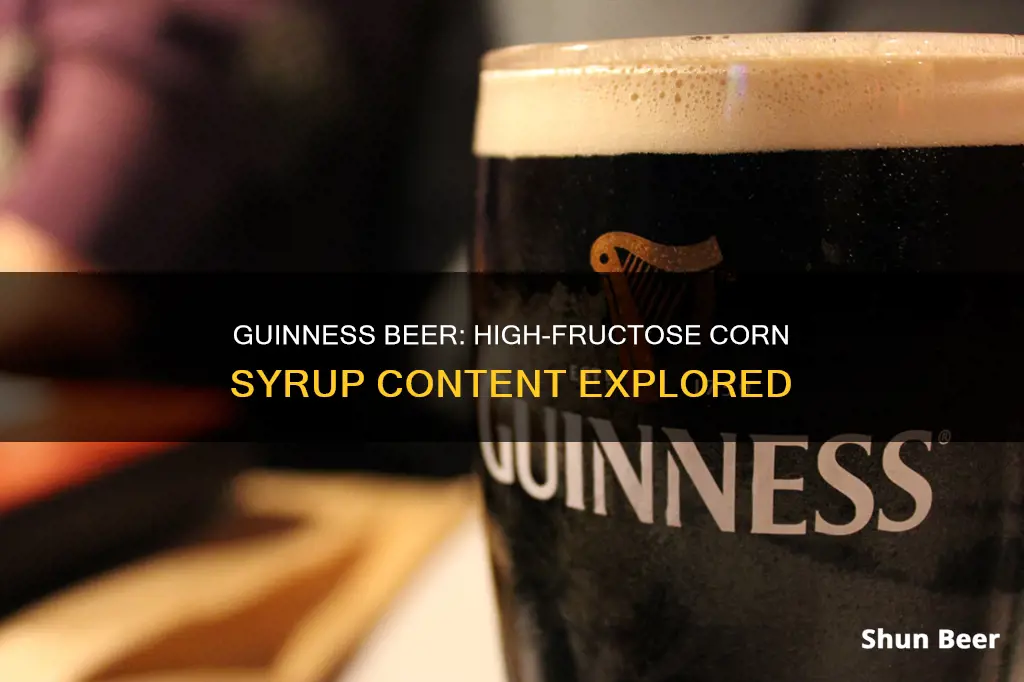
There has been much speculation about the ingredients in Guinness Beer, with some people claiming that it contains high-fructose corn syrup. However, it is difficult to find any concrete evidence to support these claims, and some sources suggest that the beer does not, in fact, contain this ingredient. One source even states that they received a response from Guinness Consumer Care, which confirmed that the beer does not contain high-fructose corn syrup. Nonetheless, the lack of transparency from beer companies about their ingredients has sparked concern among consumers, leading some to question the presence of high-fructose corn syrup and other potentially harmful additives in their drinks.
| Characteristics | Values |
|---|---|
| High fructose corn syrup in Guinness | Unclear, but likely not |
What You'll Learn

High-fructose corn syrup in Guinness
It has been rumoured that Guinness contains high-fructose corn syrup (HFCS). However, this rumour has been debunked by the company, which has stated that Guinness does not contain HFCS. Nevertheless, the rumour persists, and some people continue to boycott the product due to moral objections to HFCS.
The Rumour
The rumour that Guinness contains HFCS appears to have originated from anti-GMO activists. One Reddit user describes the rumour as a "paranoid freak-out from hardline anti-GMO people". The same user speculates that, if Guinness does contain HFCS, it is likely used in the early stages of the yeast-growing process as a high-sugar way of jump-starting the yeast.
The Response from Guinness
Guinness has denied the use of HFCS. In an email response to a customer, a Guinness Consumer Care Representative stated:
> The recipe is proprietary information, but I can tell you that Guinness contains barley, hops, yeast and water. There is no caramel or food colouring, no high-fructose corn syrup and no genetically modified ingredients in Guinness.
The Persistence of the Rumour
Despite Guinness's denial, some people continue to believe that the product contains HFCS. One blog post asserted that Guinness contains HFCS and that the author would no longer drink it. However, the author later issued a correction, stating:
> I was wrong. Sorry.
Similarly, a self-described "health-conscious" individual asserted that "Guinness beer is no longer owned by the Irish" and that "they use high-fructose corn syrup in their beer". However, this claim was followed by an update stating that Guinness no longer uses HFCS.
The Impact of the Rumour
The rumour that Guinness contains HFCS has led some people to boycott the product. One Reddit user stated that they are "boycotting the product (HFCS) altogether [...] for moral reasons". Similarly, the aforementioned blog post author stated that they "no longer drink Guinness" due to the belief that it contained HFCS.
The Reality
Despite the persistent rumour, it appears that Guinness does not, in fact, contain HFCS. The company has denied the use of HFCS, and no evidence has been presented to support the claim that it is used in the product. As such, consumers can continue to enjoy Guinness without concern over the presence of HFCS.
Guinness Beer: Does It Expire?
You may want to see also

Health concerns of high-fructose corn syrup
High-fructose corn syrup (HFCS) is an artificial sugar made from corn syrup. It is about 55% fructose, a type of sugar that takes more steps for the body to break down compared to glucose. While HFCS is a rich source of fructose, it contains no essential nutrients.
The excessive intake of HFCS is linked to various health issues, including:
- Increased liver fat and risk of fatty liver disease: Studies have shown that the high intake of fructose leads to increased liver fat, which can progress to fatty liver disease.
- Obesity and weight gain: Research indicates that the excessive intake of sugar, including HFCS, plays a significant role in the development of obesity. HFCS also promotes the accumulation of visceral fat, which is linked to health issues like diabetes and heart disease.
- Diabetes: High consumption of fructose or HFCS can lead to insulin resistance, a condition that can result in type 2 diabetes. It decreases the body's ability to control blood sugar levels, leading to increased insulin and blood sugar levels over time.
- Serious diseases: The overconsumption of HFCS has been linked to an increased risk of several diseases, including heart disease, gout, and certain cancers. It drives inflammation, which is associated with obesity, diabetes, and cancer, and may also increase harmful advanced glycation end products (AGEs) that can damage cells.
While there are concerns about the presence of HFCS in Guinness beer, the company has denied its use and stated that their beer contains barley, hops, yeast, and water.
Guinness Beer: Understanding Its Unique Percentage Composition
You may want to see also

The use of isinglass in Guinness
Isinglass is a gelatinous substance that is derived from the swim bladders of fish, usually sturgeon. It is used in the fining or filtration process to remove yeast byproducts, solids, and haze from the beer.
Guinness has historically used isinglass in its brewing process, and this has been a concern for vegans and vegetarians. However, in 2017, Guinness announced that it had eliminated fish guts from its filtration process for kegs, and that cans and bottles would be vegan-friendly by the end of that year. This was confirmed by Barnivore, a website that tracks the vegan status of alcoholic beverages.
Isinglass is considered a long-time established byproduct in the beer-making process and is not present in the final product, although there may be traces. Its use in Guinness has been a topic of discussion and controversy, with some consumers expressing concern or surprise at its inclusion, while others defend it as a traditional and functional ingredient in the fining process.
Guinness Beer: Unveiling the Secret of Its Strength
You may want to see also

Other beers that contain high-fructose corn syrup
It is difficult to ascertain a definitive list of beers that contain high-fructose corn syrup (HFCS) due to the lack of mandatory ingredient labelling on beer products. However, through independent research, some sources have identified several beers that contain HFCS or corn syrup.
Beers that have been reported to contain HFCS include Budweiser, Miller Lite, Coors Lite, and Pabst Blue Ribbon. Additionally, some beers have been found to contain corn syrup or GMO corn, which may be of concern to those avoiding HFCS. These include Corona Extra, Miller Lite, and Coors Lite.
It is worth noting that some sources claim that the presence of HFCS or corn syrup in beer may not be a significant cause for concern, as the sugars are consumed by yeast during the fermentation process, resulting in negligible amounts in the final product. Nonetheless, for those seeking to avoid HFCS or corn-derived ingredients, the lack of transparent ingredient labelling on beer products can make it challenging to make informed choices.
To make informed decisions about the beers they consume, consumers can consider contacting the manufacturers directly to inquire about specific ingredients. Additionally, supporting legislation for mandatory ingredient labelling on beer products can contribute to increased transparency and empower consumers to make choices that align with their values and health goals.
The Origins of Guinness Beer: A Historical Overview
You may want to see also

The use of high-fructose corn syrup in the fermentation process
High-fructose corn syrup (HFCS) is a sweetener made from corn starch. It is often used as a cheaper alternative to granulated sugar. The production of HFCS involves breaking down corn starch into glucose using enzymes, and then further processing the corn syrup to convert some of its glucose into fructose. This process was discovered in 1965 by the Japanese Agency of Industrial Science and Technology, and HFCS was first marketed in the early 1970s.
HFCS has seen widespread use in food manufacturing, particularly in the United States, since the 1970s. It is used in a variety of products, including soft drinks, processed foods, breakfast cereals, baked goods, and commercial "pancake syrup." One of the advantages of using HFCS in food and beverage manufacturing is its simplicity of formulation and stability, which enables processing efficiencies.
The use of HFCS in the fermentation process is a topic of discussion among beer enthusiasts and brewers. Some sources claim that Guinness beer contains HFCS, while others refute this claim. It is important to note that beer companies are not legally required to disclose their ingredients, which makes it difficult to verify the presence of HFCS definitively.
One theory suggests that HFCS may be used in the early stages of the yeast-growing process as a high-sugar way to jump-start the yeast. However, it is important to note that yeast consumes the sugars during fermentation, converting them into ethanol and CO2. Therefore, even if HFCS is used in the fermentation process, it is unlikely to be present in significant amounts in the final beer product.
The fermentation rate of HFCS is slower compared to plain glucose due to the additional conversion steps involved. However, some experimentation has shown that while fermentation with HFCS may be less "ferocious" and slightly slower, it can still yield a decent alcohol content after a few days.
Guinness Beer: Fattening or Healthy Drink?
You may want to see also
Frequently asked questions
It is unclear whether Guinness beer contains high fructose corn syrup. Some sources claim that it does, while others claim that it does not.
The ingredients in beer are not required by law to be listed on the label, and manufacturers have no legal obligation to disclose them. This makes it difficult to determine the exact ingredients in a beer.
According to my sources, the following beers contain high fructose corn syrup: Miller Light, Coors, Corona, Fosters, Pabst Blue Ribbon, Red Stripe, Budweiser, Bud Light, Busch Light, and Michelob Ultra.







